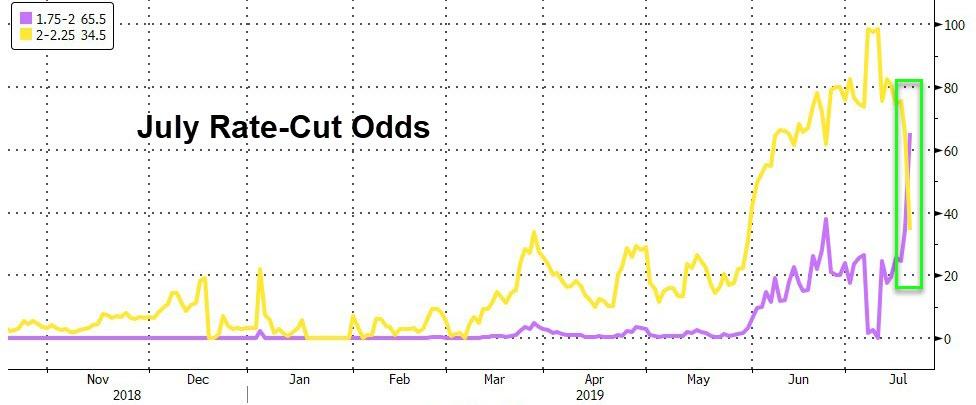There was something bizarre in yesterday’s latest Beige Book: it painted an unexpectedly strong picture of the economy. Here, again, are the key points we pulled from the summary of various regional Feds’ takes on the current state of the US economy:
- In most Districts, sales of retail goods increased slightly overall,
- Activity in the nonfinancial services sector rose further
- Tourism activity was broadly solid, with Atlanta and Richmond recording robust growth in this sector,
- Some Districts continued to report healthy expansion in the transportation sector.
- Home sales picked up somewhat, but residential construction activity was flat.
- Nonresidential construction activity increased or remained strong in most re-porting Districts, and commercial rents rose
- A modest pickup in manufacturing activity since the last reporting period was observed in a few Districts
- Increased demand for loans was broad-based, with all but two Districts noting some growth in financing activity
- Employment grew at a modest pace, as labor markets remained tight; contacts across the country experiencing difficulties filling open positions.
- The reports noted continued worker shortages across most sectors, especially in construction, information technology, and health care.
- Compensation grew at a modest-to-moderate pace, similar to the last reporting period, although some contacts emphasized significant increases in entry-level wages.
- Rate of price inflation was stable to down slightly from the prior reporting period. Districts generally saw some increases in input costs, stemming from higher tariffs and rising labor costs.
- Reduced supply boosted prices for some agricultural goods; some Districts noted increased upward transportation pricing pressures, while others highlighted price declines due to reduced demand for shipping services.
But why good news bizarre? Because as NY Fed president John Williams made clear today, not only is the Fed cutting in July, but the Fed will likely continue cutting until we get back to ZIRP again:
“First, take swift action when faced with adverse economic conditions. Second, keep interest rates lower for longer. And third, adapt monetary policy strategies to succeed in the context of low r-star and the ZLB.”
Williams’ comment resulted in market odds for two rate cuts in July surging from the low 20s to 65%!
But the big surprise isn’t what Williams said – after all he is a well-known dove. What we found even more interesting is what Fed Vice Chair and former Pimco employee, Richard Clarida – once known as a centrist – said during a Fox Business interview.
Indeed, Clarida shocked markets when he buried the Fed’s “data dependent” protocol, by saying that the Fed should not respond to data, but to what the Fed believes the data will be (ignoring for a minute that the Fed’s track record at predicting the future is far worse than even that of Wall Street). When asked to define his take on the economy and what optimal monetary policy should be, Clarida said that the U.S. economy is in a good place but uncertainties about the outlook have increased, and “under ideal monetary policy you adjust policy to keep the economy on an even keel.”
In other words, “You don’t want to wait” for the economy to turn down, Clarida said, adding that “when interest rates are close to zero, it’s important to act preemptively, shocking traders because his framing immediately brought up the thought experiment of what should happen if there is a recession, or depression, in 10, 20, 50, or even 100 years from now. Well, according to Clarida, it is now the Fed’s job to not only be data-dependent, but pre-data dependent, and even though the economy is firing on all cylinders now, the fact that at some arbitrary point in the future the economy may contract and a recession ensue, is now a sufficient reason for the Fed to cut rates as much as it wants at any given moment.

And in his latest attempt to cover for the upcoming rate cut, Clarida said that while recent U.S. indicators have been mixed – actually they have been quite strong – but just because “global data has been disappointing” and inflation has been coming in on the “soft side”, the Fed has room to act.
To summarize: the US central bank is now not only the world’s central bank, but like Tom Cruise, it has the liberty to act and do anything it sees appropriate to prevent some event from killing the US economy.
And just like that not only ZIRP, but also NIRP and stock market QE is virtually assured. Because since some time, in the distant future, a depression awaits, so the Fed has full liberty to act now and prevent it, clearly oblivious that by intervening preemptively, the Fed is assuring that the buildup of imbalances will be staggering and the next depression will be unlike anything the world has ever seen.
via ZeroHedge News https://ift.tt/2YZzeex Tyler Durden
